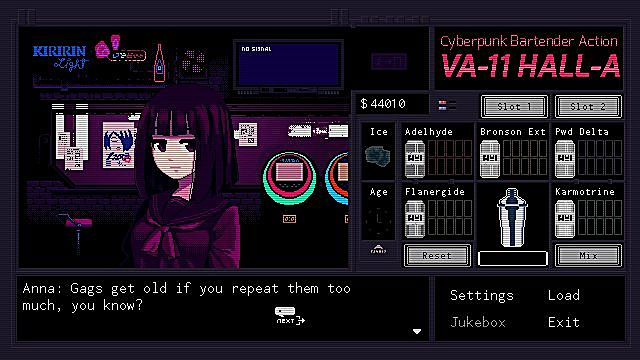
Take a moment and imagine that it's the near future, and you are a broke bartender working in lowly hole-in-the-wall bar named VA-11 HALL-11 (affectionately called Valhalla) trying to make ends meet. You feel as if your life has reached a dead end, and that there isn't much to do other than work or read articles from tabloid sites on the internet.
Your regulars consist mostly of a blonde hacker who can't hold a relationship to save her life, a kind assassin who comes to the bar to set his mind at ease, and a robot sex worker who takes pride in her job -- and they, along with your co-workers, are your only friends. This is the life of a woman named Jill, the protagonist of VA-11 HALL-A, a cyberpunk bartending simulator developed by Venezuelan studio Sukekan Games, and published by Ysbyrd Studios.
Right off the bat, VA-11 HALL-A feels reminiscent of old-school '80s and '90s sci-fi anime, with it's jazzy and catchy soundtrack, cyberpunk aesthetic, and wonderfully detailed character designs. Even with the limited setting of the bar and Jill's apartment, the game feels very much like an older adventure game, though it doesn't play like one.
In truth, there isn't much gameplay in VA-11 HALL-A at all. It's a bartending simulator that's focused less on the serving drinks part, and more listening (or in this case, reading, as there are no voice-overs) to your customers' woes. There are two parts to the core gameplay: serving drinks to customers, and hanging out in Jill's apartment. When making drinks, a majority of the time, a customer asks for a specific drink, and Jill (the player) puts the ingredients in the blender and mixes it.
The drink mixing mechanic is interesting.
Not because the drinks themselves are hard to make (it's actually rather easy mixing the drinks), but Jill is at the risk of becoming distracted at work if she doesn't pay off her bills or buy an item she wants. There are also times when the customer isn't aware of what he/she wants, and will give vague instructions, or will even intentionally throw the player in a loop with oddly phrased orders. At certain points, Jill can mix drinks to have more or less alcohol (if any at all), thus changing the outcome of the conversation, the situation a costumer gets in after drinking, or even the game's ending. The player doesn't decide what Jill can say, as she has her own defined personality, but entire situations and even characters Jill meets can change depending on the drinks she mixes.
The segments of the game in between Jill's shifts at Valhalla are set in her apartment, where she lives alone with her cat named Fore. In her apartment, Jill can read articles from the tabloid news site Augmented Eye, read threads on the blog site Danger/u/, keep up with pop star and Hatsune Miku parody *Kira* Miki's blog, customize her room, pay bills, or go shopping for decorations.
It is very important to keep note that if you aren't a particularly good bartender, Jill will be strapped for cash, and the player will have to decide whether they want to save funds to pay bills, or to go out and purchase whatever Jill wants so that she doesn't distracted.
What truly makes the game shine are Jill's interactions with the other characters.
None of them, including Jill herself, are anybody special, and are simply trying to get by to the next day without getting mugged or murdered. Along with the regulars who visit Valhalla, there will also be less frequent visitors -- such as Donovan, an editor at the tabloid site Jill reads, and Sei, a rescue worker for a police force of sorts named the White Knights. There are also Jill's two co-workers, Dana and Gillian, who are both mysterious for differing reasons, with Dana seemingly having an absurd life and Gillian being a complete mystery.
All of these characters are incredibly expressive in both dialogue and animations, bringing them to life. The writing is compelling enough to balance comedy and drama nicely -- even if the comedy does fall flat sometimes, as much of it relies on references to other media that the player may not be familiar with.
If there is one thing that gets in the way of the drama, especially in the bar segments, it's the soundtrack.
While I think most of the soundtrack is well-composed and memorable, in the bar during Jill's shift, the song playing is from a jukebox where all of the songs are player-chosen. It's an idea that sounds great in theory, considering the player is managing a bar after all, but a happy and upbeat song can come on when someone is having an emotional breakdown. It doesn't ruin the scene, but it can take the player out of the moment.
When everything comes together, there are genuinely moving moments in the VA-11 HALL-A's story. When a piece of Jill's past catches up with her, she becomes an incredibly compelling protagonist faced with issues that many people in real life have faced, in one way or another. And as a result, her actions are realistic for what she is going through. It shows that, even in the future, people are still people, and no matter what happens, the world keeps spinning, as it always does.
0 comments:
Post a Comment